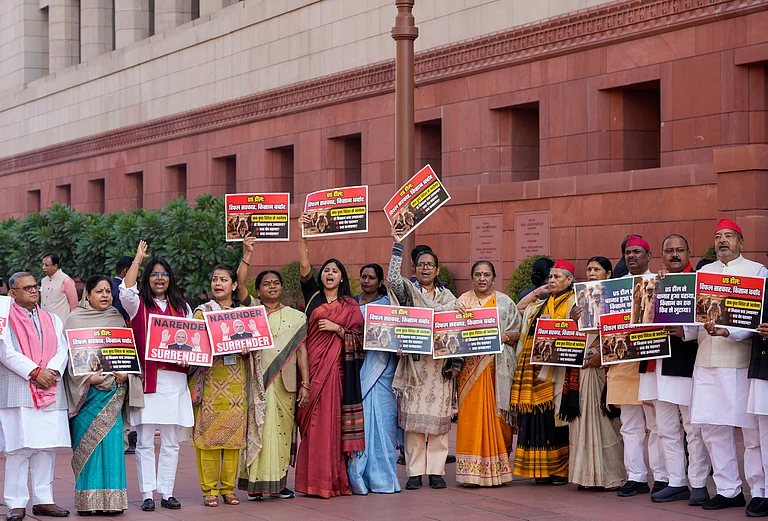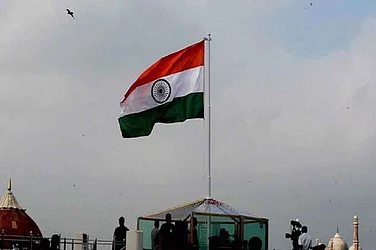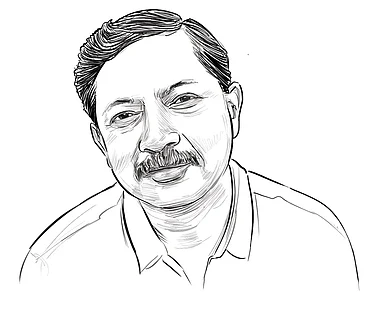For the past five years, Calcutta-based The Telegraph newspaper has gained a reputation as a symbol of resistance to the policies and politics of Prime Minister Narendra Modi with its high-decibal front page headlines and coverage. During the same period though, supporters of the BJP and many observers have accused the newspaper of turning a Nelson’s eye to the errors of Bengal’s Mamata Banerjee-led Trinamool Congress government. In an interview to Outlook’s Puneet Nicholas Yadav, The Telegraph editor R. Rajagopal dismisses accusations of bashing Modi while going soft on Mamata Banerjee and answers a host of other questions on the state of the Indian media today. Excerpts:
Why are we witnessing an increasing polarisation within the Indian media, particularly while reporting on politics or social issues?
RR: I am not sure whether the Indian media has become polarised. Polarisation means you believe in something and you have a clear opinion, which can be completely unreasonable but an opinion, nevertheless. I do not have a problem with polarisation in newsrooms as long as it is not driven by our baser instincts. I think large sections of the Indian media do not take a position now on most issues that may annoy the government.
The imperceptible transformation began in the late 1980s or 1990s when editors of some of the legacy newspapers were turned into endangered species. The booming bottom-lines in the 1990s were cited as evidence that you do not need an editor to run a paper. We did not realise or acknowledge then that the policy was gnawing at the very foundation of the character of each newspaper. The ground was already prepared with cricket leaping to front pages from sport pages and showbiz hogging limelight in mainstream media. The jingoistic cricketing rivalry with Pakistan ensured a pop-patriotic appeal that allowed the audience to give vent to their vile opinion about the Other couched in sports terminology. Politics was treated as a pariah and politicians became everybody’s favourite whipping boy. The media was probably reflecting what was happening elsewhere in society. In the process, unwittingly or otherwise, we killed off the checks and balances that would have prevented the rise of the majoritarian monolith that is now threatening to rip our country apart. Newspapers became cheerleaders of mass hysteria instead of being change agents. To be popular became more important that the craving to be right.
I do not consider as journalism the television circus that goes on at the so-called primetime. Even here, whatever you call it, there is hardly any polarisation. Barring a few channels, all have become echo chambers that mass-produce the government’s narrative. For polarisation, you need an opponent of some comparable size. Where is such an opponent now? Most are competing with one another to say the same good things about the government at the Centre.
So what happened to being neutral as a journalist?
RR: I do not understand what neutral reportage is. If it means “the PM said this” and “the Opposition leader condemned what the PM said”, I do not think that is journalism. I think that is “neutered” journalism. A more “neutral” description would be “accurate reportage”. That is the foundation of any form of journalism.
Is the media betraying the faith of its audience?
RR: I am not sure. If the audience really did not want the kind of journalism that is being dished out, will the media continue to do so? I am not trying to justify our poor content the way Bollywood defends atrocious super-hits – 'the audience wants it'. But, I think the media audience cannot be absolved entirely either. If they refuse to swallow the trash they are being force-fed, no newspaper can continue to do that. My biggest worry is that the credibility of media – and the price – has reached such a nadir that the audience just does not care. An indifferent audience is the worst threat the media can face, and our irrelevance cannot be far behind.
Does the revenue model of traditional media, with its over-reliance on government advertising, prohibit a strong, anti-establishment editorial line?
RR: If you mean reports are being filed that favour someone or malign someone to please an advertiser, which includes the government, or do his or her bidding, that cannot be called a “revenue model”. It is plain bribery and it is a crime. I think the problem with the current revenue model is that it is incapable of making ends meet. Many newspapers have made news one of the cheapest in the country. Tell me, what can you buy for Rs 4 or 5 now, other than a newspaper? The net impact of this is that the readers are contributing only a modest percentage of the total cost of producing a newspaper. The lion’s share comes from the advertisers. This essentially puts a paper at the mercy of the advertiser – again, the government is a big advertiser – if there is cartel action. So, an advertiser need not dictate what should or should not be printed. All they need to do is squeeze the ad flow and wait for a paper to either buckle or go belly up.
Eventually, if a newspaper has to stand on its feet, it needs to broad base its revenue source as wide as possible. The broadest revenue source are the readers; it will not be easy for one government or a couple of companies to influence them. The safest option is to remain economically independent so that you are not held hostage by cartels or power-wielders.
The key question is: do newspapers have the courage to raise the cover price, retain readers on the strength of the quality of journalism the paper practices and reduce the dependence on advertisers? Right now, the answer appears to be “no”.
Would greater transparency of media ownership and stakes of the media owners in government policy make any difference?
RR: Aren’t the broad contours of the ownership of most big houses already known now? On the second part, about stakes of media in government policy: Definitely, if a particular media group stands to gain from a government policy that is being covered, it must be disclosed.
My submission is that there are several fundamental problems that need to be solved in journalism. Many are related to journalists themselves. I have seen veteran journalists making sweeping statements without proof or data to back them up. Several well-known journalists are happy swimming with the tide, calling politicians “criminals” and “tainted” just because cases are pending against them. No questions are asked about the nature of the cases or whether they had been convicted. Another set of journalists do not do any homework. They go to press conferences, take in garbage and eject it into the newsroom, which is served up faithfully to the audience without any attempt at checking the veracity of the content.
There is an impression that The Telegraph is happy to bash Modi and the BJP but goes soft on Mamata.
RR: The newspaper I work for is not 'happy' bashing Modi or anyone. Why would we like to make enemies daily and be treated as pariahs by those in power just for the sake of so-called bashing? We try to report events on the basis of available and reliable information, which is very difficult to gather in India. But, an impression has gained ground that we are soft on the Mamata government, probably because our high-decibel headlines have more or less been confined to the Modi government. Events which are beyond our control but steered by the Modi government are deciding their coverage for themselves. It is not that we are going out of our way or spending resources to run a campaign against the Modi government. The bitter truth is that we have not broken any story that has put the Modi government in trouble. We are merely reporting events as they take place. If the treatment is being noticed, that’s because only a few others are doing so. You cannot blame us for that. If Mamata Banerjee takes any decision like the CAA or NRC, how can a newspaper not oppose it? But she has not done anything like that. And the Modi government has pushed through such a decision. Just to claim that we are neutral, we can’t be attacking Mamata Banerjee for the sake of attacking her. This kind of play-safe 'neutrality' is one of the key factors that have reduced journalism to a clerical exercise that is killing the craft. Our treatment of news can definitely be criticised but I do not agree with the interpretation that the objective is to be soft on Mamata.
What is the course correction that media desperately needs?
RR: If I know the answer, I will sweep all the Pulitzers next year and a Nobel, too. I have no answers. But, as a journalist, I think we should re-skill ourselves. When was the last time you have seen a reporter or a sub-editor reading a book to learn something? When was the last time you have overheard two journalists discussing how a copy could have been written better or curse themselves for not writing a shorter opening paragraph? We have forgotten the craft, which does not mean linguistic felicity alone. Language is important but only to communicate with clarity. The craft of journalism packs a value system too, starting with the question why we became journalists. I am afraid we are not asking such questions but sleepwalking sheep-like into the slaughterhouse.

























